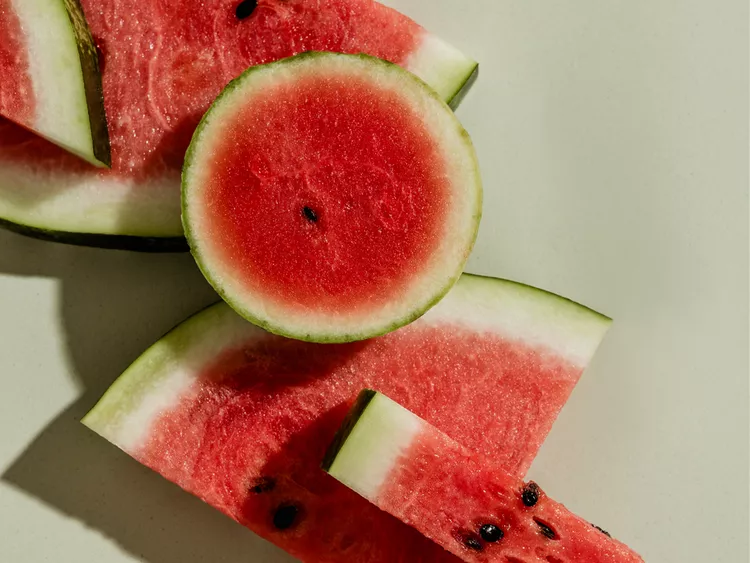Hydrating, sweet, and tinged with nostalgia, watermelon is a shining star in the world of fruit. However, its appeal doesn’t end there. Watermelon is a standout in the beauty industry as well—specifically skincare. Many topical formulas utilize the sweet fruit for its hydrating and soothing properties, and we predict we’ll see more watermelon-infused products in the years to come. To learn more about why watermelon is useful in skincare, we asked three board-certified dermatologists to fill us in. Keep reading to learn about all of the benefits of watermelon in skincare.
What Is Watermelon?
Watermelon, or Citrullus lanatus, is a large, sweet fruit mainly comprised of water. Specifically, it contains nearly 92% water and 7.55% of carbohydrates. This is what makes this popular fruit extremely hydrating and refreshing to eat. Ingesting watermelon also offers many health benefits as it is rich in lycopene, vitamin A, vitamin C, and antioxidants. As a skincare ingredient, watermelon has a few potential benefits: it’s moisturizing, may reduce inflammation, and is rich in antioxidants that show promise for skin health (more on that ahead).
Benefits of Watermelon for Skin
Rich in nutrients and antioxidants: “Watermelon contains many important nutrients that are beneficial for the skin.” Watermelon contains vitamins A and C, which may help dull or damaged skin. Watermelon also contains another powerful and skin-protecting antioxidant called lycopene. “These antioxidants help neutralize free radicals generated by UV radiation and environmental pollutants.” By protecting the skin from oxidative stress, watermelon can help prevent premature aging, maintain skin elasticity, and promote a more youthful appearance.
Moisturizing: Watermelon is so refreshing on a hot summer day because of its high water content. For this same reason, watermelon skincare products can moisturize and help combat dry skin. “When applied topically, it can help replenish skin moisture, improving hydration levels and reducing dryness and roughness.” Watermelon seed oil contains linoleic acid and arachidic acid, which are fatty acids that help maintain the cell membrane. They may help soothe the skin and improve its elasticity.
Reduces inflammation and acne: Watermelon skincare products are rich in amino acids, which makes them a great option for acne-prone or inflamed skin. For some people, they help even the skin’s texture, brighten the skin, and even add a nice glow. “Watermelon contains amino acids like citrulline, which have soothing and anti-inflammatory effects on the skin.” When used in skincare, watermelon can help alleviate skin redness, irritation, and sensitivity, making it beneficial for individuals with sensitive or reactive skin. If you live in a cold, dry climate, there’s another benefit, as citrulline can also help protect the skin in these conditions.
Side Effects of Watermelon
Watermelon is an ingredient that’s generally safe and non-irritating for all skin types. However, if you’re allergic to watermelon, it’s best to steer clear of watermelon skincare products. You’ll also want to discontinue using watermelon-infused products if you experience any irritation. And, as always, if the irritation persists, consult with a dermatologist.
How to Use It
There are many ways you can incorporate watermelon into your skincare routine. It’s generally best to use formulated products that contain watermelon as an ingredient rather than trying to make your own products. This helps ensure the product is effective, long-lasting, and safe for your skin.
“Skincare products that contain watermelon extracts or seed oil are formulated to provide stable and standardized concentrations of beneficial compounds, ensuring consistent and reliable results.” Watermelon seed oil, extracted from the seeds of the fruit, is rich in essential fatty acids and can be incorporated into facial oils, serums, or moisturizers. It helps to lock in moisture and protect the skin barrier.
Look for moisturizers, serums, masks, and mists that mention watermelon extract (or Citrullus Vulgaris) or watermelon seed oil within the ingredient list. You may experience the best results from using a serum containing active concentrations of watermelon’s antioxidant and fatty acid components. “Active concentrations of ingredients are important, and even if a product contains a certain ingredient, but the concentration of that particular active is too low, you won’t see an effect.”
FAQ
Does watermelon reduce wrinkles?
By protecting the skin from oxidative stress, watermelon can help prevent premature aging, maintain skin elasticity, and promote a more youthful appearance.
Can I apply watermelon on my face every day?
Generally, most skin types can tolerate topical applications of watermelon daily. However, you should follow the instructions that pertain to your specific product.





Comments are closed.